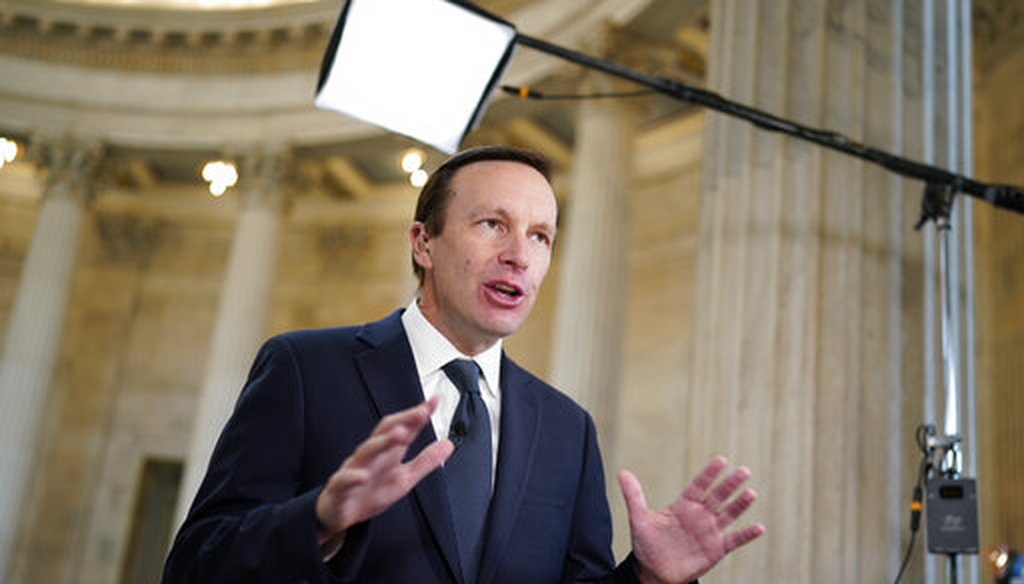Stand up for the facts!
Our only agenda is to publish the truth so you can be an informed participant in democracy.
We need your help.
I would like to contribute

Sen. Chris Murphy, D-Conn., speaks during a morning television interview, on May 25, 2022, in Washington, D.C. (AP)
Fact-checking Sen. Chris Murphy on the ages of mass shooters
If Your Time is short
• Murphy is accurate, and even a little understated, in the context of school shootings alone, according to a Washington Post database of school shootings since 1999.
• The share of teenagers committing mass shootings overall is significantly smaller.
• The term "killers" is not entirely accurate for this statistic, since some of the shootings analyzed by the Post did not result in deaths.
Sen. Chris Murphy, D-Conn., has worked to enact restrictions on guns ever since the Sandy Hook school shooting in Newtown, Connecticut, an area he then-represented in the U.S. House of Representatives.
After another elementary school shooting — this one in Uvalde, Texas, on May 24, 2022 — Murphy gave an impassioned speech on the U.S. Senate floor to urge redoubled efforts to curb gun violence. The speech made the rounds of news shows and was widely shared on social media.
In an interview with CNN the day of the shooting, Murphy focused on the young age of the shooters in Uvalde and a May 14 mass shooting in Buffalo.
"I want to get rid of these assault weapons," Murphy said. "But maybe we can find common ground on just limiting who can get access to them, maybe say you have to be 21 instead of 18, seeing that most of these killers tend to be 18, 19 years old."
This fact-check will focus on whether "most of these killers tend to be 18, 19 years old."
When we checked with Murphy’s office, they pointed to a database project undertaken by The Washington Post that tracks every act of gunfire at a primary or secondary school during school hours since the Columbine High School massacre April 20, 1999. The Post found more than 200 incidents that met the project’s criteria.
When the Post analyzed these shootings, it found that more than two-thirds were committed by shooters younger than 18. The analysis found that the median age for school shooters was 16.
So, using this criteria, Murphy is correct, even slightly understating the case.
Other data points
For overall mass shootings — not just school shootings — academic studies have found that about a quarter of shooters were younger than 25.
A large-scale RAND study found that 26% of mass public shooters between 1976 and 2018 were younger than 25. Another study from the University of Alabama found that 27.2% were younger than 25, and that 6.8% were younger than 18.
A final point: Murphy referred to "killers," but the Post analysis he relied on included both incidents that resulted in deaths and those that did not.
Our ruling
Murphy said after the shooting in Uvalde that "most of these killers tend to be 18, 19 years old."
That’s largely accurate when looking at school shootings alone, according to a Washington Post database of school shootings since 1999. The database did include shootings that did not result in a death, and the share of teenagers committing mass shootings overall is smaller.
We rate the statement Mostly True.
RELATED: All of our fact-checks about guns
Our Sources
Chris Murphy, interview with CNN, May 24, 2022
Washington Post, "More than 311,000 students have experienced gun violence at school since Columbine," May 25, 2022
RAND, "Mass Shootings in the United States," updated April 15, 2021
Adam Lankford and Kaitlyn B. Hoover, "Do the Ages of Mass Shooters Matter? Analyzing the Differences Between Young and Older Offenders," March 11, 2019
Email interview with Andrew Morral, senior behavioral scientist at the RAND Corp., May 25, 2022
Email interview with Rebecca Drago, spokesperson for Chris Murphy, May 25, 2022
Browse the Truth-O-Meter
More by Louis Jacobson
Fact-checking Sen. Chris Murphy on the ages of mass shooters
Support independent fact-checking.
Become a member!
In a world of wild talk and fake news, help us stand up for the facts.




































